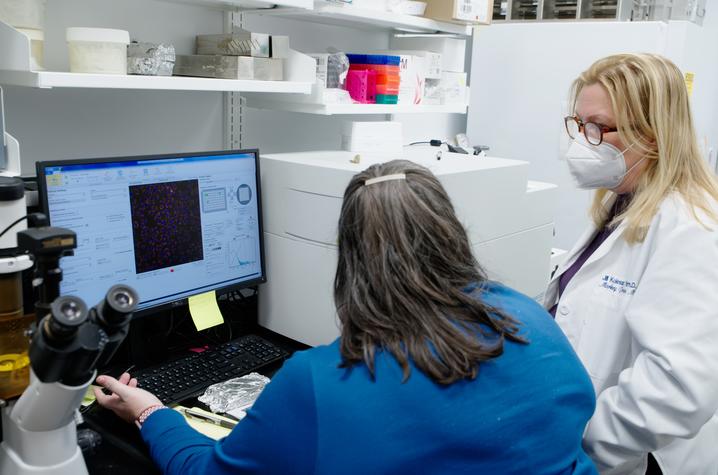Pediatric Cancer Research Funding Critical to Save Lives
Video produced by UK Research Communications. To view captions for this video, push play and click on the CC icon in the bottom right-hand corner of the screen. If using a mobile device, click on the "thought bubble" in the same area.
LEXINGTON, Ky. (May 23, 2022) — Innovative research in pediatric cancers is happening every day at the University of Kentucky.
In the United States, 80% of children are cured of their cancer, but 20% are not.
“The most important thing we can do is find new treatment modalities for those 20% of children who die from their cancer,” said Jill Kolesar, Pharm.D., professor of Pharmacy and co-chair of the UK Markey Cancer Center Molecular Tumor Board.
The UK Markey Cancer Center provides leading care to children in Kentucky, and it is important to continue supporting this critical pediatric cancer research to identify new mechanisms that are causing these cancers and new treatment modalities.
Childhood cancer rates in Kentucky appear to be higher than the national rates for several cancer types. Eric Durbin, DrPH, director of the Kentucky Cancer Registry and the Markey Cancer Center’s Cancer Research Informatics Shared Resource Facility, is working to understand why Kentucky children are experiencing higher rates of brain and central nervous system cancers.
So far, he has found no correlation to known industrial or environmental exposures. Now, he is looking at household pesticide use, radon exposure and other factors.
All of this research requires essential monetary support – and a large part of that funding comes from the Kentucky Pediatric Cancer Research Trust Fund (KPCRTF). Established in 2015 by Senate Bill 82, the KPCRTF is an independent board administered by the Kentucky Cabinet for Health and Family Services. The trust fund is funded in the amount of $2.5 million each year of the biennium as part of the 2018 budget bill.
KYPCRTF funding enabled UK researchers to collect brain tumor tissue from children who have had biopsies or brain surgeries. Durbin is also examining inherited mutations by collecting saliva samples from pediatric cancer survivors.
“Trust funding has been essential to this work. I am not sure we could have done any of this without some financial support that covers staff and material expenses,” Durbin said. “We are already seeing a return on that investment.”
Durbin’s research team has obtained funding for two additional studies – one related to participating in the National Childhood Cancer Registry, and another to collect pathology slides to scan and create digital images of slides for childhood tumors.
Kolesar is using KYPCRTF funding for several projects, including isolating and testing cancer-fighting chemicals in Artemisia annua.
“Pediatric cancers are very rare, and it is very hard to get funding to support pediatric cancer research,” Kolesar said. “Having this type of support that is focused on these childhood cancers is critical for us to continue our work and make groundbreaking discoveries.”

As the state’s flagship, land-grant institution, the University of Kentucky exists to advance the Commonwealth. We do that by preparing the next generation of leaders — placing students at the heart of everything we do — and transforming the lives of Kentuckians through education, research and creative work, service and health care. We pride ourselves on being a catalyst for breakthroughs and a force for healing, a place where ingenuity unfolds. It's all made possible by our people — visionaries, disruptors and pioneers — who make up 200 academic programs, a $476.5 million research and development enterprise and a world-class medical center, all on one campus.




